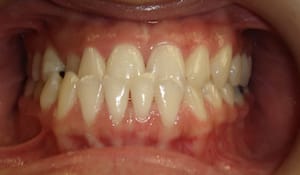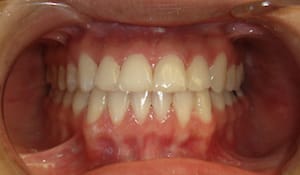Home - All About Braces - How to Know If You Need Braces - Underbite

Erick practices orthodontics in our Riverton Oral Health office.
Underbite: Lower Teeth in Front of Upper Teeth
Underbites: What Causes Them and How Braces Can Help.


An underbite occurs when the lower front teeth extend in front of the upper front teeth when the mouth is closed. This type of bite misalignment is often visible from a young age and can affect the way a child eats, speaks, and grows — both physically and socially.
In moderate to severe cases, an untreated underbite can lead to long-term issues with jaw function, facial balance, and oral health.
What Causes an Underbite?
- A larger lower jaw or smaller upper jaw
- Tongue thrusting or chronic mouth breathing
- Extended thumb sucking or pacifier use
- Delayed loss of baby teeth
- Impacted or missing upper teeth
Signs of an Underbite
You might notice:
- The bottom teeth overlapping the top teeth when your child bites down
- The chin appearing more prominent or “jutting forward”
- Difficulty chewing certain foods
- Speech issues (especially with “s” or “sh” sounds)
- Jaw pain or discomfort
Underbites are often easier to correct if caught during growth. That’s why early evaluation is so important.
Why Early Treatment Matters
- Uneven wear on the teeth
- TMJ pain or clicking
- Receding gums or bone loss
- Facial asymmetry
- Difficulty with chewing or speaking clearly
How an Fix an Underbite
Treatment depends on the child’s age and the severity of the underbite. Common solutions include:
- Braces with elastics to guide jaw alignment
- Palatal expanders (in younger children)
- Reverse pull headgear (to encourage forward growth of the upper jaw)
- Tooth reshaping or extraction (in certain cases)
- Jaw surgery (for non-growing teens or adults with severe underbites)
An early orthodontic consultation can determine which options are most appropriate — and often simplify treatment down the line.
Surgical Underbite Correction


When to Schedule a Consultation
If you notice your child’s lower teeth sitting in front of their top teeth — or if their chin appears more prominent than expected — it’s time for an orthodontic consultation. At Families First, we offer complimentary consultations that include imaging and expert treatment guidance.
Our orthodontic team will walk you through the best approach for your child’s bite, growth stage, and long-term oral health goals.
Claim Your Complimentary Consultation
Our orthodontic team is here to help with complimentary orthodontic consultations in Bluffdale, Riverton, Stansbury Park, and West Jordan.
Complete the form below or call (801) 254-9700 to schedule.
Frequently Asked Questions
What causes an underbite in kids?
Most underbites are due to uneven jaw growth, but habits like thumb sucking or mouth breathing can make them worse over time.
Is an underbite a serious problem?
Can braces fix an underbite?
When is the best age to treat an underbite?
Is jaw surgery always required for underbites?
No — many underbites can be corrected with braces and growth-guiding appliances if caught early.